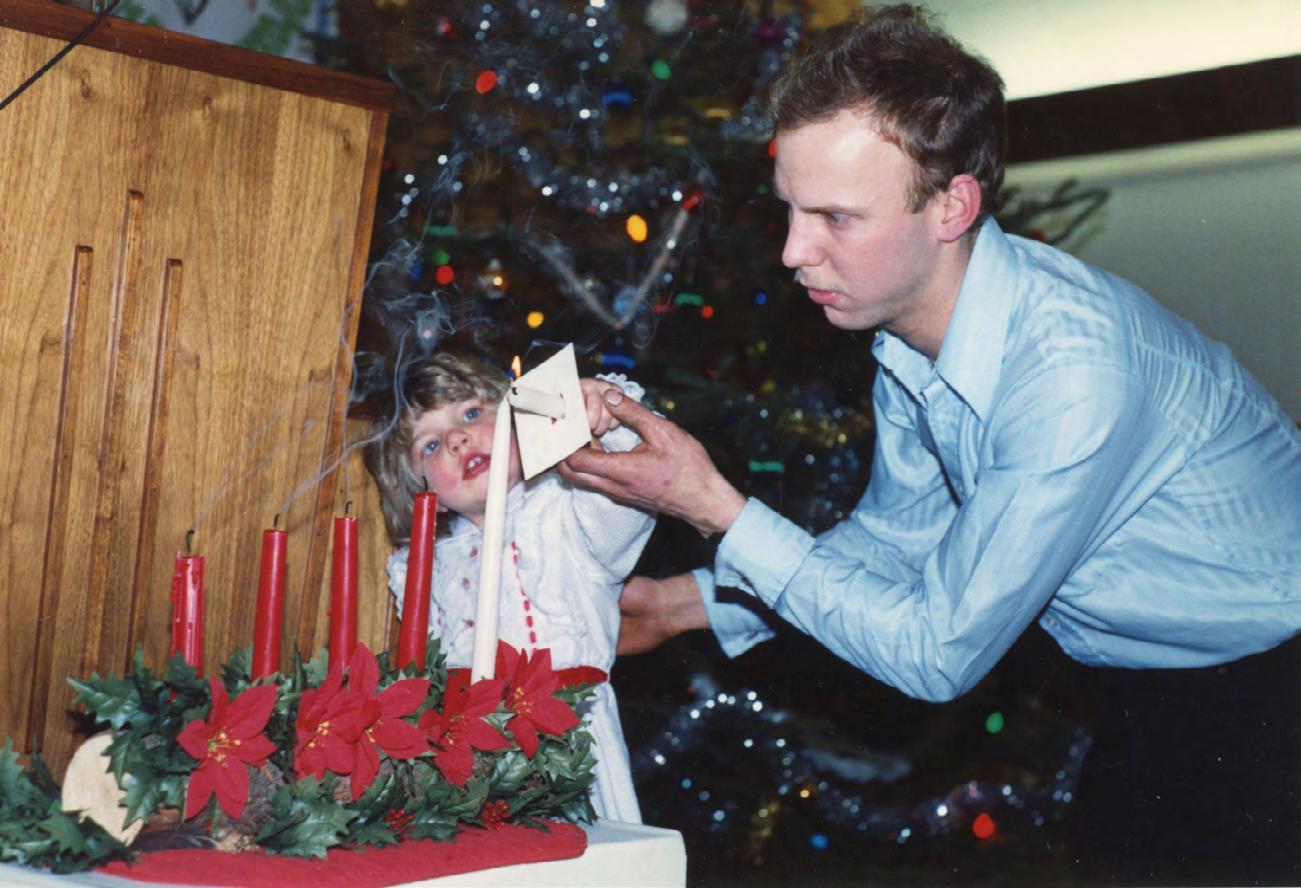Digest
MBHERALD.COMMore than sixty years of sharing the life & story of the Mennonite Brethren in Canada

More than sixty years of sharing the life & story of the Mennonite Brethren in Canada
VOLUME 61, NO. 12

Mennonite Brethren Herald Digest is digitally published monthly by the Canadian Conference of Mennonite Brethren Churches, primarily for the use of its members, to build a Canadian MB community of faith. We seek to 1) share the life and story of the church by nurturing relationships among members and engaging in dialogue and reflection; 2) teach and equip for ministry by reflecting MB theology, values, and heritage, and by sharing the good news; 3) enable communication by serving conference ministries and informing our members about the church and the world. However, the opinions expressed here are not necessarily those of the church as a whole.
Manitoba R3M 3Z6 Phone: 204-669-6575 Toll-free in Canada: 888-669-6575 MBHERALD@MBCHURCHES.CA WWW.MBHERALD.COM ISSN: 0025-9349
Last Sunday during church, a woman stood to speak. “It’s an odd time for me to give my testimony,” she said. “Usually, we do this when we’re on cloud nine, but today I’m sinking.”
Today I’m sinking. That sobering admis sion echoes in my heart. You can say the pandemic is over, but we still reel from its aftershocks. We are not okay.
When as a worship committee, we sat down to plan the advent season, we had no idea where to begin. How could we present a prescribed curriculum when our members are scattered, and many of us question whether we can—or even want to—attend church these days? The entire concept of community is in flux, and we’re too worn out to do anything about it.
At my church, we sing a Chris Tomlin song called Adore during Christmas. One lyric stands out: “What have I to offer to heaven’s King?” What I have to offer today is much less than I could give three years ago. We are hum bled whenever we consider the manger, yet I feel outright hobbled this year. I am ashamed of how little I have to offer.
Imagine the widow’s shame when she gave but two copper coins while the wealthy
gave extravagantly. Seeing this, Jesus tells his disciples, “Truly I tell you, this poor widow has put more into the treasury than all the others. They all gave out of their wealth; but she, out of her poverty, put in everything—all she had to live on.” (Mark 12:43-44)
Our meagre offerings, when given freely, honour God. They are received and reclaimed, and we, too, are redeemed. It’s okay not to be okay; Christ came to Earth to save all human ity, not just those of us who have it all together. Find the courage to admit you are sinking— find greater courage to bring your offering to the King, despite it.
This issue of MB Herald Digest includes advent reflections from Ken Esau and Phil Gunther. As we reach the end of another vol ume, I extend my unending gratitude to our contributors and advertisers who make MB Herald possible. Thank you for your gift to the MB family.
With respect,

“WHAT HAVE I TO OFFER TO HEAVEN’S KING? I’LL BRING MY LIFE, MY LOVE, MY ALL.”
—MARTIN CHALK, GRAHAM A. KENDRICK “ADORE”

You could invest with any number of financial institutions, but by choosing CCMBC Investments, you also invest in the local MB Church.
Planning and saving for the future is essential. With a CCMBC Registered Retirement Savings Plan (RRSP), you can start saving for your retirement while deferring income tax and investing in the growth of God’s Kingdom.
Earn a return while investing in ministry, tax free. A Tax Free Savings Account (TFSA) is a registered plan that allows your investment to grow tax free throughout your lifetime.
CCMBC Investments is accepting new funds from existing or new investors. Contact Capstone Asset Management (1-855-437-7103) to get started.
ccmbclegacyfund.com
legacy@mbchurches.ca
capstoneassets.ca
ccmbc@capstoneassets.ca








The lighting of candles during the Sundays of Advent is an honoured tradition in many churches. The order, colour, and meaning of each candle can sometimes vary, but the significance of light is an image that remains the same. Without a Saviour, we remain hopeless people left struggling in the darkness. Yet, the arrival of Jesus is a celebration of the light that illuminates our path, for Jesus once said, “I am the light of the world. Whoever follows me will never walk in darkness, but will have the light of life” (John 8:12).
As We Wait is a collection of devotions designed to point you to the light of Jesus. The Scriptures assigned for each day are united in their purpose to anticipate the coming of Christ with eager anticipation— they point us to God’s promise, they equip us with hope, they encourage us to prepare, and they comfort us with love.
MB Seminary invites you to read the selected text for each day and to meditate on the reflections that have been written by men and women from MB churches across Canada. As you are able, invite others to share in this experience with you and explore the questions together as a way of considering how the Holy Spirit may be prompting you to respond.


As We Wait is a reminder of our united dependence on Jesus, the true light who gives us eternal hope that will not disappoint.

Need help subscribing to the online digest? Email us at mbherald@ mbchurches.ca, or call 1-888-669-6575 and ask for Carson or Liam.
SBCollege.ca

Train
The BC Conference of MB Churches seeks a full time Director of Resource Ministries to join their executive team and bring expertise in the areas of finances, governance and risk management. The position includes resourcing of churches and church leaders in various activities related to administrative leadership and effective stewardship. The Director or Resource Ministries both responds to the needs and concerns of the churches and provides equipping that will maximize their effectiveness.
Interested applicants can send their resume and cover letter to the BCMB conference offices at connie@bcmb.org
To read a more detailed Position Profile click here
Want
During Advent, let us pause to deliberately set our soul’s posture for worshipping Emmanuel – God with us. Let us see this exercise as our Yuletide spiritual discipline. A fundamental aspect of this practice for me has been to recall in detail Scripture’s profound testimony of Jesus. What follows is a recounting, an oration, a declaration, a proclamation of Christ. I invite you to build upon this biblical recitation with a response of worship (prayer, song, journaling) and then spiritual realignment – a delib erate seeking to be attuned to both the heart and purposes of the Father.
“THIS ADVENT WE LOOK TO THE WISE MEN TO TEACH US WHERE TO FOCUS OUR ATTENTION. WE SET OUR SIGHTS ON THINGS ABOVE, WHERE GOD IS. WE DRAW CLOSER TO JESUS… WHEN OUR ADVENT JOURNEY ENDS, AND WE REACH THE PLACE WHERE JESUS RESIDES IN BETHLEHEM, MAY WE, LIKE THE WISE MEN, FALL ON OUR KNEES AND ADORE HIM AS OUR TRUE AND ONLY KING.”
MARK ZIMMERMANN“THE LORD IS COMING, ALWAYS COMING. WHEN YOU HAVE EARS TO HEAR AND EYES TO SEE, YOU WILL RECOGNIZE HIM AT ANY MOMENT OF YOUR LIFE. LIFE IS ADVENT; LIFE IS RECOGNIZING THE COMING OF THE LORD.”
HENRI NOUWEN“My Jesus” is a segment of a sermon I wrote inspired by S.M. Lockridge’s message: “The Seven Way King.”
As this journey of Advent begins
I am mindful of eternal things I posture myself to worship
I have come to make much of Jesus
My Jesus is the Son of Almighty God the very Word of God the Wisdom of God
My Jesus is the firstborn over all creation All things were made by Him, through Him, and for Him He is the Heir of all things
He is before all things and in Him all things are held together Nothing in all creation is independent of Him
He is the Alpha and Omega – the beginning and the end My Jesus is the One who was, who is and who is to come – the Almighty
My Jesus is Emmanuel – God with us
He is the radiance of God’s glory the exact representation of God’s being the visible expression of God’s invisible being History is anchored to my Jesus It is now Anno Domini (the year of our Lord/Jesus)
My Jesus is the same yesterday, today and forever That’s my Jesus
WORSHIP RESPONSE (IN SONG)
Jesus Name above All Names Naida Hearn Video
Jesus, name above all names Beautiful Saviour, Glorious Lord Emmanuel, God is with us Blessed Redeemer, Living Word Jesus, name above all names Beautiful Saviour, Glorious Lord Emmanuel, God is with us Blessed Redeemer, Living Word
Lord I praise your name
Jesus name above all names Jesus, name above all names Beautiful Saviour, Glorious Lord Emmanuel, God is with us Blessed Redeemer, Living Word Blessed Redeemer, Living Word Blessed Redeemer, Living Word
WORSHIP RESPONSE (IN PRAYER)
On this First Advent Jesus, receive my worship My posture is one of humility You are beyond comprehension – divine, eternal, sovereign Blessed be your name, Jesus Blessed be your name Blessed be your name All glory be given to you, Jesus All glory be given to you All glory be given to you For you alone are worthy to receive it This day and every day May the words of my mouth and the meditation of my heart be pleasing to you Amen.
WORSHIP RESPONSE (IN WRITING)
On this First Advent Jesus, I feel…
THOUGHT FOR THE WEEK “Let’s approach Christmas with an expectant hush, rather than a last-minute rush.”
Anonymous
My Jesus is a King the King of kings the King of Israel the King of heaven and earth the King of Righteousness
His kingdom is both present and coming, powerful and eternal
My Jesus is also LORD the LORD of all lords the LORD of the living and the dead
My Jesus is the Son of Man the Christ – the anointed One the Lion of Judah the Lamb of God the bright Morning Star
To those who love Him, my Jesus is a Living Stone a Foundation Stone, a Cornerstone, a Capstone
To others He is a stone of stumbling over whom they will fall That’s my Jesus
WORSHIP RESPONSE (IN SONG)
His Name is Wonderful Chris Tomlin Video
Come see the Baby Crib for a Bed His mother Mary Lay down His sweet head The starlight was shining The wise men were led Come see the baby And worship Him
His name is wonderful, counselor Mighty God, Prince of Peace Everlasting Father Emmanuel Holy One, Son of God Savior of the world
WORSHIP RESPONSE (IN WRITING )
On this Second Advent Jesus, I hope…
THOUGHT FOR THE WEEK
“The Advent season is that time when…we, in short, go back, that we might look forward to His coming.” R. C. Sproul
On this Second Advent Jesus, receive my worship
My posture is one of submission a citizen to his king a servant to his lord a disciple to his master
You are my foundation in every regard, my rock of hope and help Blessed be your name, Jesus Blessed be your name Blessed be your name All glory be given to you, Jesus All glory be given to you All glory be given to you
For you alone are worthy to receive it This day and every day May the words of my mouth and the meditation of my heart be pleasing to you Amen.
My Jesus is the Bread of Life The Way, the Truth and the Life He is the Resurrection and the Life My Jesus is Life
My Jesus is the author and champion of my salvation
My Jesus is the Good Shepherd He has compassion for sinners, heals the sick, and defends the weak
The Spirit of God came upon my Jesus God Almighty said of my Jesus “This is my son, whom I love. In Him I am well pleased” He said, “Listen to my Son.”
My Jesus was anointed to preach good news to the poor and announce the year of the Lord’s favour to proclaim freedom for prisoners recovery of sight for the blind to release the oppressed to proclaim justice to the nations
My Jesus gives rest for the weary
My Jesus is a Messiah – a Savior, a Rescuer, a Deliverer a Worker of miracles
He made the blind to see and the deaf to hear He raised the dead and calmed the storms of the sea He is the good news of great joy
He is the Gospel of God Almighty Jesus is the center of my theology He is the center of my life
Upon Him will I set my mind, fix my eyes, and rest my hope He is with me always, and His promises are sure That’s my Jesus
WORSHIP RESPONSE (IN SONG)
Praise the Name of Jesus Roy Hicks Jr. Video
Praise the name of Jesus, Praise the name of Jesus. He’s my Rock, He’s my Fortress, He’s my Deliverer.
In Him shall I trust. Praise the name of Jesus.
WORSHIP RESPONSE (IN WRITING)
On this Third Advent Jesus, I believe…
THOUGHT FOR THE WEEK
“Advent is the gentle nudge that invites me to remember that the truth most worth know ing is that Jesus Christ is the only way Home. It is also a gentle reminder that I ought to keep my eyes upon Him all year long.”
Jean-Michel Hansen
WORSHIP RESPONSE (IN PRAYER)
On this Third Advent Jesus, receive my worship My posture is one of praise Praise to you my shepherd Praise to you my saviour Praise to you my healer Praise to you my deliverer
You are my life, the joy of my salvation Blessed be your name, Jesus Blessed be your name Blessed be your name All glory be given to you, Jesus All glory be given to you All glory be given to you
For you alone are worthy to receive it This day and every day May the words of my mouth and the meditation of my heart be pleasing to you. Amen.
My Jesus is a Redeemer, a Sanctifier, a Transformer It was prophesied about my Jesus that He would be a suffering Servant, that He would be despised and rejected It was foretold that He would be pierced and crushed for the terrible things I did, am doing and will do
And, by His wounds and death I would receive healing. My Jesus is a sinless High Priest able to fully sympathize with our weaknesses
He is the one and only Mediator between God and me
My Jesus is also the divine, sinless, perfect sacrifice for my sins
My Jesus gave His life for me
His name means “the LORD saves” He will save people from their sins He paid my penalty
He took upon Himself the curse that condemned me My Jesus said, “Whoever hears my word and believes him who sent me has eternal life and will not be condemned; he has crossed over from death to life.”
He bore in His body my rebellion and self-centered ways
It was His love for me that kept Him on a Roman cross
My Jesus carried, covered and forgave, my sins
Because of Jesus my sins and lawless acts will no longer be remembered In Jesus, as far as the east is from the west so far have our sins been removed from us
My sins were poured in Jesus at His crucifixion
His righteousness was poured into my life at my conversion
To God, we are now the aroma of Christ the sweetest scent of redemption That’s my Jesus
WORSHIP RESPONSE (IN SONG)
His Name Is Jesus Phil Wickham Video
The King is in the room Come see the scars of love upon his hands The King is in the room We’ll watch the darkness flee at his command Who is this King? Who is this King?
His name is Jesus His name is Jesus Light of the world There’s freedom in his name Awesome in power Reigning forever Light of the world There’s freedom in his name
WORSHIP RESPONSE (IN WRITING)
On this Fourth Advent Jesus, I see…
THOUGHT FOR THE WEEK “Mark the season of Advent by loving and serving the others with God’s own love and concern.”
Mother Teresa
WORSHIP RESPONSE (IN PRAYER)
On this Fourth Advent Jesus, receive my worship
My posture is one of thankfulness my sins forgiven the curse once upon me removed my soul redeemed my freedom won
My heart is overflowing with gratitude
You are my righteousness, the source of my salvation Blessed be your name, Jesus Blessed be your name Blessed be your name All glory be given to you, Jesus All glory be given to you
All glory be given to you
For you alone are worthy to receive it This day and every day May the words of my mouth and the meditation of my heart be pleasing to you Amen.
The grave could not hold my Jesus Placed in a wooden manger raised upon a wooden cross Placed in a stone tomb raised by the Rock of Ages He rose from the dead and ascended into heaven
My Jesus defeated sin, the devil and death King Jesus now sits at the right hand of God Almighty He is the spring of purpose, the source of hope and the fountain of joy That’s my Jesus
My Jesus blesses without measure peace beyond understanding
My Jesus brings freedom from addiction, bondage and despair His promises are sure, His grace is sufficient, and His yoke is light
My Jesus will transform your heart, mind and spirit He will redeem your world My Jesus is the One we need in our lives
“I have a great need for Christ; I have a great Christ for my need.”1 That’s my Jesus
I am a CHRISTian – a little Christ
I am the beloved of God, a child of the King, a person of purpose with something to bring
I am a treasure, cherished to the core, a saint, who in Christ Jesus is always more My Jesus is my all and all
As this journey of Advent ends a new journey of Christmasse begins2
Jesus comes as a gift, a great light in the darkness Emmanuel, God with us
Born into flesh so we could be born of the Spirit
An incarnation of help, healing, and hope An incarnation of peace and promise
An incarnation grace and joy
He is Lord, light, love, and life
That’s my Jesus
WORSHIP RESPONSE (IN SONG)
What a Beautiful Name Ben Fielding & Brooke Ligertwood Video
You were the Word at the beginning One with God the Lord Most High Your hidden glory in creation Now revealed in You our Christ
What a beautiful Name it is What a beautiful Name it is The Name of Jesus Christ my King What a beautiful Name it is Nothing compares to this What a beautiful Name it is The Name of Jesus
WORSHIP RESPONSE (IN PRAYER)
On this Christmas Day Jesus, receive my worship My posture is one of wonder the Creator in a manger the Sovereign wrapped in flesh the Almighty now fragile the Eternal One pressed into time and history You are light, lord, love and life, Emmanuel
What a beautiful name it is Blessed be your name, Jesus Blessed be your name Blessed be your name All glory be given to you, Jesus All glory be given to you All glory be given to you For you alone are worthy to receive it This day and every day May the words of my mouth and the meditation of my heart be pleasing to you. Amen.
WORSHIP RESPONSE (IN WRITING)
On this Christmas Day Jesus, I give…
THOUGHT FOR THE WEEK
“The omnipotent, in one instant, made himself breakable. He who had been spirit became pierceable. He who was larger than the universe became an embryo. And he who sustains the world with a word chose to be dependent upon the nourishment of a young girl. God as a fetus. Holiness sleeping in a womb. The Creator of life being created.” Max Lucado
1. Charles Spurgeon
2. “Christmasse” (“Christ’s mass” in archaic English) – the worship of Christ
is
Warning: The following article could discourage a cute, comfortable, and romanticized view of Christmas.
I
’ve often had a hard time knowing exactly what to think about Christmas and the birth of tiny baby Jesus in the Bethlehem stable. Growing up, I imagined (with the “help” of our church’s Christ mas Eve pageant) a heart-warming scene of a little baby born in a stable with animals, shepherds, angels, and three wisemen or magi (whatever they are) bringing expensive and carefully wrapped presents. There was always a lot of starlight shining down on the scene. It is easy to cling to our romanticized and warm-feelings perspective on Christmas: “Let’s read the Christmas story together, pass around the hot chocolate, and then open up our Christmas gifts that are really at the cen tre of all of this excitement and anticipation.” A visitor who didn’t know much about the deeper meaning could certainly wonder about the connection between the baby, the stable, and all of this shopping frenzy.
I was told that the significance of the birth was that Jesus obviously had to be born so that he could, much later, die a sinless death on the cross for my sins. The importance of Christmas was simply that it needed to happen so the really important event (Easter) could happen. I have come to the conclusion that I have been
living with a cute, comfortable, and romanticized view of Christmas while ignoring the immense theological and real-life significance of this event.
I remember watching sports highlights on TSN (The Sports Network) where they would often refer to a crit ical moment somewhere in the game as the “TSN Turning Point” because that moment changed the game. That moment set the direction for what happened afterward and, in a sense, sealed the outcome. The Gospel writers (especially Matthew and Luke in this case) include a bunch of strong hints that the babe in the manger is the TSN Turning Point for the entire history of the world. Each part of the story of Jesus, from the birth in Beth lehem to the ascension in Galilee, changes everything. In their view, the events of Christmas are about much more than a tiny baby, a stable, sheep, and expensive gifts given by the magi!
First, the Gospel writers are shouting to us that this baby Jesus is in reality the almighty King bringing the desperately awaited Kingdom of God. This King will be given “[a]ll authority in heaven and on earth” (Mat thew 28:18). In Jesus’ birth, the King and God’s Kingdom are arriving. Time will be measured into all eternity
from the day of Jesus’ birth forward. From the moment of Jesus’ birth, all other kings and kingdoms are given notice that they are secondary to King Jesus and this Kingdom. The Bethlehem Christmas story is a political story, a revolution story, a world-transforming story— because from this point on, everything will be different. The powers of darkness, sin, and death are doomed from this moment on.
This birth event is the TSN Turning Point for our whole world even though our world still suffers from violence, injustice, war, addiction, climate destruction, and every other consequence of sin. The Gospel writers are trying to tell us that the ultimate causes behind these will be defeated by this King. The birth itself is the launch of the revolution that will ripple across time and space leaving nothing untouched. The birth itself leads naturally to the cross, the resurrection, the ascen sion, and ultimately Jesus’ return and the full presence of the Kingdom on earth as it is in heaven.
It is clear that the angel Gabriel was well aware that this birth was all about a King and a Kingdom (Luke 1:32-33). It is clear that the shepherds were in the know as the angel of the Lord declared to them that this child was the “Christ” (or Messiah or King; Luke 2:10). It is clear that the magi were well aware of the revolution ary nature of these events as they searched for the “king of the Jews” (Matthew 2:2-3). King Herod knew the implications of this birth and arranged the massacre of the baby boys in Bethlehem hoping to eliminate the threat that Jesus posed (Matthew 2:16). Herod recog nized that this was no cute and romantic story. The Gospel writers are showing us that the Bethlehem moment is the TSN Turning Point because it is a King and Kingdom moment.

The most appropriate response to the birth of Jesus begins with our intentional worship of this King. Wor ship, individual and corporate, involves a heart and mind posture of joyful surrender and submission to Jesus, the verbal and melodic proclamation of truth, and actions that faithfully demonstrate these realities. When we see the Christmas scene, it should immedi ately lead us to proclaim our allegiance to this King and our desire to seek first this Kingdom. We then can look at our crazy Christmas schedules and ask how we can use our time and resources in this season to demon strate and embody this worship.
This worship means that we must pull ourselves away from our online (or in-person) shopping for a time and experience the reorientation that is part of worship ping before King Jesus (like the magi do in Matthew 2:11) and offering Jesus everything that we value (like the magi do in the same verse). Christmas calls us above all else into worship and the offering of our lives, our time, our gifts, our affections, and our futures to this King. All of our gift giving and gift receiving, our house
decorating and food sharing, and even our acts of kind ness and charity—must come from this place of worship. In doing these things, God’s Spirit is at work dethroning the “self” as king (Matthew 16:24-25) and reorienting us towards the only Kingdom that is eternal and worthy of the name. This is what worship of the true King involves.
Second, it is one thing to recognize that the baby Jesus is the King bringing his Kingdom, but this does not tell us immediately about what kind of Kingdom it will be. The great news is that this baby is not only King but Immanuel—our “God-with-us” (Matthew 1:23). He is not only King, but also love embodied, love incar nated. God so loved the world that he sent his Son (John 3:16). We should see nothing but love in the sending. Love in the Bible is an action word that exists as it is displayed (as are many other biblical words like “hate,” “remember,” “faith,” “forget,” “believe,” and so on). Love to be real must involve actions that can be seen, felt, and tasted. God’s love in the Bible is displayed as all cre ation is moved closer to God’s intentions for it.
The baby Jesus is God’s love embodied. Jesus is the agent of God’s love who moves all creation back toward God’s intentions for it. The baby Jesus is, therefore, God’s light sent in the darkness. The baby Jesus is, therefore, God’s hope sent into our hopelessness. The baby Jesus is the most rightly named “love child” in the history of the world. Sending him to earth was an act of God’s love for the world. Every action of Jesus recorded in the Gospels is literally an embodiment of God’s love for the world.
So we want our worship of the true King and our seeking first of the eternal Kingdom to come from that same place of love. We deny ourselves and take up our cross because of love. We invite others to Jesus because of love. We walk with others through joy and suffering because of love. We live into generosity and hospitality because of love. We have hard conversations because of love. We cannot truly worship without love, and we cannot truly love without worship.
As we gather together in this Advent season, and finally on Christmas Day, let us not fail to see that in front of us is much more than a tiny baby, magi, sheep, shepherds, and an angel choir. The Gospel writers have painted a much deeper picture of a baby who is both King and Love embodied. This the TSN Turning Point. Let us bow in worship! Let us embody this transform ing love!
In the pat I ence of love’s delay, part 3
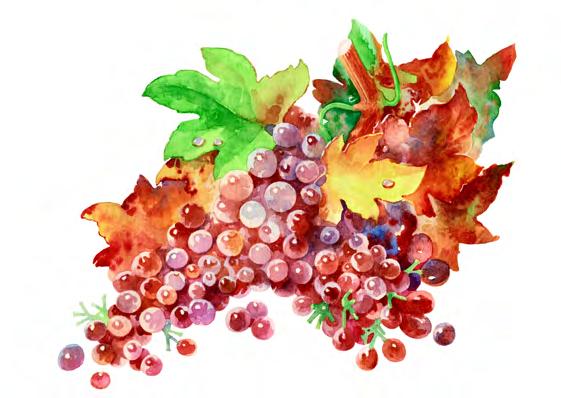
In the previous installments of this 4-part series addressing Christian patience, I suggested first that we should take heed of the need for patience in a time when God’s Word is abroad, and then that we should acknowledge with deep gratitude that God’s patience gives humans, along with the rest of cre ation, space and time to become what God wants us to be. The season of Advent provides an appropriate occasion for us to consider the role of Christian patience, as we turn our attentiveness to wait ing and expectancy of the Lord’s coming and return.
In this article, I ask the question of what it might look like for the church to practice patience by turning to the early Anabaptist leader Pilgram Marpeck. For Marpeck, the pursuit of peace is not primarily a technique or strategy, but rather an expression of a vibrant and real Christian spirituality, itself expressed in the exercise of patience. Patience makes peace possible in the church (insofar as it is possible), and that patience is generated and made imaginable through the humanity of Christ, understood within a Trinitarian framework, enlivened by the Holy Spirit, and practiced by the church both internally and externally.
According to Marpeck, genuine patience flows from the basis of the work of Jesus, but not in a way that is limited to Jesus as
example.1 The patience of Christ with us is offered to the Christian to be accepted by faith, as a gift from God. Virtues such as patience are pure only through faith; outside of faith they are impure and an abomination before the face of God. There fore, counsels Marpeck, “Let us see to it that we remain Christians, live patiently, and accept the victory of the Lamb to the glory of our Father and of his Christ.” 2
Marpeck does not understand the prac tice of patience primarily as a series of actions, or even a disposition as much as the receiving of a gift. Rather, God allows us glimmers of hope, which we must
1 John Rempel, ed., Jorg Maler’s Kunstbuch, 386.
2 Marpeck, Later Writings by Pilgram Marpeck and His Circle, 41, 42.
anticipate with patience. 3 God’s generosity, not human agency and effort, is central here; generosity extended by God, by which His gifts, including patience, will “be found among true believers until the end.”4
Marpeck uses the metaphor of Christ as Physi cian to explain and reinforce notions of Christ’s patience; a physician commands those who care for the sick to have patience with the illness, and not to bury someone alive, or expel the sick. “Rather, one waits with patience, endurance for him to get better… Therefore, I desire to be patient with all who are bought with the costly pearl, the death, shed blood of the Lord Jesus Christ, since God requires patience and the long-suffering from us through Christ.”5 Those who are brought back to Christ the Physician will want to live out that love, patience, mercy, and gen tleness in relationships with other members of the body of Christ.6
Further, Marpeck connects the Christian exercise of patience to a faithful understanding of time, which opens the possibility of liv ing in such a way as to not run ahead of Jesus Christ or of the Holy Spirit in anything, whether banning or forgiving others, command ing or restricting activities, creating order, or changing custom. Marpeck’s concern throughout his writings is the unfaithful hasti ness of Christians in their ethical, spiritual, and ecclesial lives, along with the impatience of those who resort to the use of the temporal sword. Rarely does Marpeck warn of the dangers of moving too slowly, or of lagging behind Jesus, or the Holy Spirit. He seems to think that moving too hastily is clearly the greater temptation for the Christian. Judging too hastily is not to be understood as a tactical or strategic mistake, but a theological error, a distortion of the Christian view of time which is based on the work of Jesus Christ. A theologically based view of time, the faithful pace or speed of judgment, includes an accep tance of the reality that Jesus Christ has fulfilled time, and it is to this truth that the Christian is bound, not to some notion that we can or must control what happens according to our own judgments. That is, a Christian view of time and its concomitant exercise of patience can not be bound to the work of the state or the saints but to the work of Jesus, in whom we have seen that “love is patient in time; who can recount her patience or declare her end or her measure? In her patience and forbearance lies human blessedness. The delay of love is in its time the highest reward of waiting. For even the angels wait with longing to see (1 Peter 1:12) what fulfillment her patience will accom plish. For in the patience of love’s delay lies human blessedness.” 7
3 Marpeck, The Writings of Pilgram Marpeck, 394.
4 Ibid., 72, 73.
5 Marpeck, The Writings of Pilgram Marpeck, 354.
6 Snyder, “An Anabaptist Vision for Peace,” 192.
7 Rempel, Jorg Maler’s Kunstbuch, 312, 313.
Marpeck makes extensive use of hor ticultural images such as those found in John 15 to intensify his admonitions regarding the church’s practice of patience. Discerning the difference between weeds and the planted crop is not the only task facing the faithful Christian; discernment is also necessary to distinguish between blossom and foliage on the one hand, and mature fruit on the other, making sure not to judge people before the right time.8 Here too Marpeck makes what is by now a familiar move in his thinking; namely, asserting that the maturing of fruit is only made possible by the work of Jesus Christ. What can we learn as a church from Marpeck’s understanding of Christian patience? How can a congregation exer cise the kind of theologically understood patience which Marpeck developed in his sixteenth-century context? Briefly, he works out his theology of church disci pline as an extension of the same logic he applies to the use of coercion by tempo ral authority.9 That is, Marpeck’s basic argument is that “[t]he temptation to exer cise worldly authority through the use of the sword is of the same kind of sinful bondage as the temptation to make pre mature judgments in the church through
8 Ibid., 323.
9 Stephen Boyd, Pilgram Marpeck: His Life and Social Theology, 110–12.
Discerning the difference between weeds and the planted crop is not the only task facing the faithful Christian; discernment is also necessary to distinguish between blossom and foliage on the one hand, and mature fruit on the other, making sure not to judge people before the right time.
the hasty use of the ban.”10 Marpeck employs those hor ticultural images of foliage, blossom, and fruit along with references to speed to make his theological argu ment for the practice of patience in church discipline. He points out that those who live in sin bring forth their own fruit, in due time, that fruit being open vice – foli age or blossoms do not provide a conclusive basis on which any kind of judgment can be brought. Further, just as it takes time for sin to produce its real fruit, so too does it take time for faith to bring forth its fruit. In both cases, the exercise of patience is crucial for the body of Christ - in avoid ing sin as it seeks to be faithful in relation to the non-coercive prac tice of church discipline, and in the non-coercive passing on of the faith. Judgment of sinners, of sin ful behavior is not to be avoided, according to Marpeck. However, of much more urgency is the prob lem of being far too hasty in judgment. Judgment of sinners, while important, must never hap pen before the right time, i.e., when fruit appears, not when foli age or blossoms appear. “Whoever, therefore, establishes, commands, prohibits, coerces, drives, pun ishes, or judges before the time for good or evil is revealed, lays claim to the authority, power, and office of the Holy spirit of the Lord Jesus, Christ and, contrary to love, goodness, and grace, runs ahead of Jesus Christ.” To run ahead of Christ, to indulge in judgments that are too hasty, to forego the exercise of patience, is to multiply the occasion and practice of sin in the body of Christ. “Whoever presumes to decide and judge, before the revealing of guilt, is a thief and a murderer (Jn. 10:1). He runs ahead of Christ, who alone is the revealer of good and evil in the heart.” To indulge hasty and uncer tain judgments is itself sin which leads to anxiety and fear of unrighteousness, when in fact Christians are to be debtors to nothing but love. Marpeck considers it more important to avoid those who judge too quickly that to avoid those who are being judged, since to judge too hastily is “contrary to the patience of Christ.” In
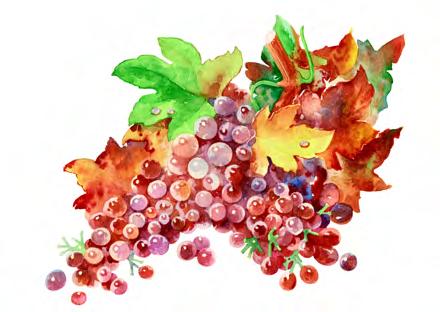
What can we learn as a church from Marpeck’s understanding of Christian patience? How can a congregation exercise the kind of theologically understood patience which Marpeck developed in his sixteenth-century context?
10 Gerald Mast, “Patient Separation in Marpeck’s Theological Rhetoric,” 86.
avoiding hasty judgment (negatively put) and practic ing patience (positively put), the church opens the possibility of what Marpeck terms as “improvement” in the Christian life; judgments made in love and patience are always concerned with improvement, but never before their time. Such exercise of patience is the essence of loving Christian service, according to Marpeck, seen in the true spirit of love that never seeks its own, but always the service and use of others,11 for in the patience of love’s delay lies human blessedness. May it be so in our congregations as we wait in worship for the coming of our Lord.
11 Marpeck, The Writings of Pilgram Marpeck, 324-333, 347.
DR. PAUL DOERKSEN is Associate Professor of Theology and Anabaptist Studies at Canadian Mennonite University.




What happens when parents follow their children? After Edier (right) met Jesus afresh at the Matthew Training Center, his parents (Didier and Sandra) followed him there and began a new phase of their own discipleship journey with Jesus.
What happens when parents follow their children? After Edier (right) met Jesus afresh at the Matthew Training Center, his parents (Didier and Sandra) followed him there and began a new phase of their own discipleship journey with Jesus.
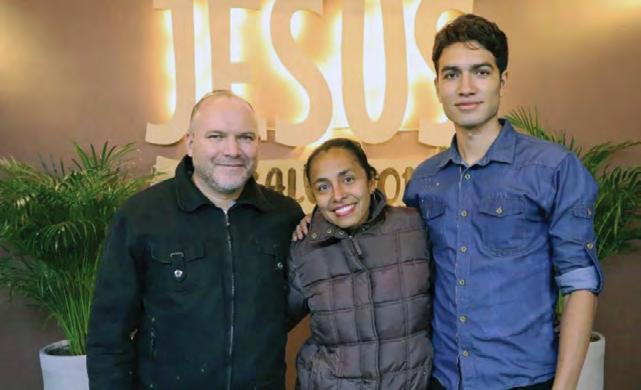
“I remember when we first interviewed him,” said Jen Schmidt, one of the leaders of the HADIME discipleship program at the Matthew Training Center in Guadalajara, Mexico, “he told us he was a follower of Jesus. But we weren’t sure if he really understood what that meant.”
The young man in question was Edier from Colombia. At the time, he was nineteen years old, and very young in his understand ing of God. “I wondered what God wanted to do in his life,” said Jen.
“When we prayed as a leadership team, we all agreed that we wanted to extend an invitation to Edier to come to Mexico and participate in HADIME 2020.”
At the time, Jen and the oth ers at the Matthew Training Center had no idea what this would mean for Edier and his parents. They did know that Edier’s grandfather was a pastor and conference leader among MB churches in Colombia, but it seemed that Edier was on a different path, and they did not know about his parents.
“Within the first month of HADIME, as the other students shared their stories,” Jen recalled, “God was clearly at work in Edier’s life. He was learning about spiritual disciplines and what it really meant to follow Jesus.”
Then, one day, Edier approached the leaders and was honest with them about his own faith journey. “He told us very plainly that he didn’t know God,” Jen said. “He realized that he hadn’t been walking a life of obe dience and surrender to the Lord, that he hadn’t ever truly given his life to the Lord.”
So, he did. Still at the beginning of his discipleship program, Edier surrendered his heart to Jesus and began his own journey of obedience.
“It was a beautiful moment for all of us,” said Jen. “We feel so privileged to have witnessed this turning point in Edier’s life. For those of us who know him, he is such a kind, generous, and sincere young man. Now we see him grow ing in his heart to serve others and to live out the calling that God has placed on his life.”
Edier knew that his decision to follow Jesus was also a deci sion to follow in the footsteps of his grandfather. It was actually his grandfather who had originally told Edier about HADIME.
At the end of the disciple ship program, Edier made plans to return to Colombia and be with his parents. However, it was during the pandemic, so it was not an easy time to travel internationally. Eventually, he found an opening on a humani tarian flight and traveled home.
“We were glad to hear that he made it back to Colombia,” said Jen. “Because of his time away and all the uncertainty of COVID, we knew that his parents would be thrilled to have their only child at home with them again.”
After the family was reunited for a time, Edier’s parents, Didier and Sandra, were deeply impacted by the transformation that they saw in their son’s life. In fact, his life change made them think about their own lives.
Didier had served for many years in the Colombian police force and was now retired. He and his
wife had time on their hands, and they were asking God what they should do for the next season of life.
“I began receiving messages from Sandra,” said Jen, “asking about whether they could possibly come as volunteers to the Matthew Training Center. It was at a time when COVID was still causing some issues for international travel, but as we prayed and talked about the idea of them volunteering, the excitement grew.”
During the time that Edier was a student in Guadalajara, he had seen various people come from dif ferent places to volunteer their time and energy at the Matthew Train ing Center. They often came to serve in some practical ways around the property or in the kitchen. It was Edier who planted this seed in his parent’s hearts.
Finally, in November 2021, the whole family arrived at the Mat thew Training Center as volunteers: Didier and Sandra, as well as Edier.
“I quickly realized the value of this family,” Jen recalled, “their gifts of service, logistical and prac tical help, media work, and creative problem solving. Our center was so blessed by their presence with us.”
The family committed them selves as volunteers for six months, with an openness to extend their









stay. However, before long, some thing changed.
During this season, Sandra and Didier experienced something sig nificant in their own relationships with God. As they lived in this spir itually vibrant community and witnessed the dynamic change in the lives of other HADIME partici pants, they began to seek after God in a new way and they experienced healing in their hearts of past hurts. Instead of continuing as volun teers, they asked whether they could themselves become HADIME partici pants. Although they would be older than other participants and at a different life stage, they felt the invi tation from God to join the program.
“I love how God calls families in such creative ways to himself and to his purposes,” said Jen. “San dra, Didier and Edier all have their own journeys of faith. They each have their own callings to live out. But right now, they are serving and learning together as a family, and I am confident that God will con tinue to reveal his plan to them.”
Pray for families in mission and for generations of disciples and disciple makers. Edier and his family are part of an intricate web of togetherness in mission. Edier’s grandfather, Manuel Mosquera, was discipled in Colombia by long-term Multiply missionaries, Trever and Godard, who eventually transitioned to Mexico where they started the Matthew Training Center and HADIME, where Edier and his parents were discipled by disciples of Trever and Joan. Who are you discipling?
Help cover costs for HADIME participants like Edier, Didier, and Sandra by contributing to the Matthew Training Center at multiply.net/mtc
MARK JH KLASSEN is a writer with Multiply and a member of Yarrow MB Church (BC).This article was previously published in Witness, Multiply’s quarterly magazine. To read other stories from the latest edition, go to multiply.net/witness or subscribe at multiply.net/subscribe

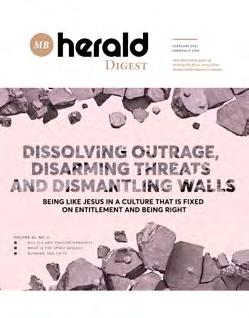

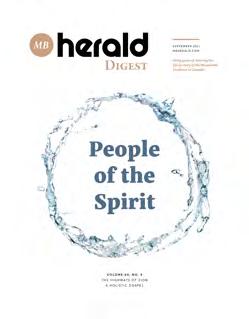
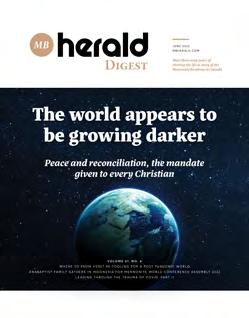


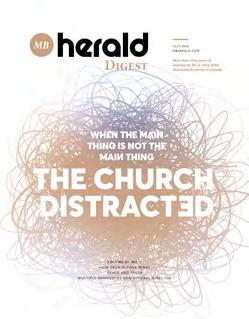
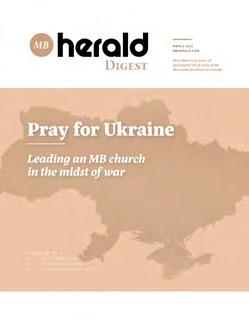

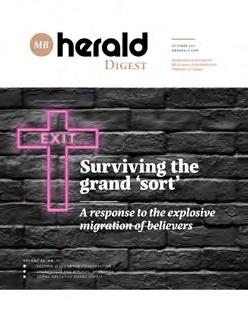



Anne was just sweet 16 in 1946 when she left rural Manitoba to begin the next phase of her life in Winnipeg. She found work in a sewing factory and reconnected with Jake, her soon-to-be husband. By the late 1950s, they had both become Christians and were actively engaged in their church as a family. At various times they served as deacons, taught new believers’ classes, participated in small groups, and served as greeters. Anne was busy ensuring the family was well-fed and clothed and the house spotless. And, as the grandchildren multiplied, she and Jake would travel to see them. As her children grew up, they left home – and Winnipeg. So, in 1997, she and Jake did the same. They settled in Abbotsford, B.C., near two of their children and grandchildren. A few years after Jake died in 2015, Anne moved to independent living at Menno Place. There she was able to make new friends and rely on the staff to help her manage her day-to-day activities. Anne spent her last 14 months at Maplewood House where she received excellent care. Anne was the eighth of eleven children, the longest living and last surviving of her siblings. In the closing paragraph of her Life Story and Testimony she wrote: “I will continue on my journey until Jesus comes to take me home.” Accomplished!
Birth: June 20, 1930
Birthplace: Gretna, Man.
Death: January 30, 2022
Parents: Diedrich Klassen & Helena Loewen
Married: Jacob Krahn Wiebe, July 29, 1950 [d. 2015]
Family: children Rick, Terry (Diane), Gail Chamberlain (Paul), Judy Wardrop (Mark), Tim (Debbie); 9 grandchildren; 4 greatgrandchildren
Church: Clearbrook, Abbotsford, B.C.
Baptism: Bethel Mennonite, Winnipeg
OBITUARIES HAVE LONG BEEN A VALUED PART OF THE MB HERALD . FROM THE FUNERAL BULLETINS, EULOGIES, AND NEWSPAPER OBITUARIES YOU SEND, OUR EDITORS CRAFT LIFE STORIES OF OUR MEMBERS TO INSPIRE AND ENCOURAGE OUR READERS, CREATING A MEMORIAL OF MB SAINTS. CLICK HERE TO SUBMIT AN OBITUARY
www.lcc.lt study@lcc.lt
